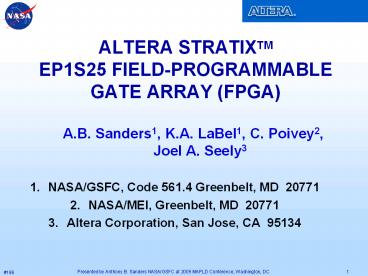ALTERA STRATIXTM EP1S25 FIELD-PROGRAMMABLE GATE ARRAY (FPGA) - PowerPoint PPT Presentation
Title:
ALTERA STRATIXTM EP1S25 FIELD-PROGRAMMABLE GATE ARRAY (FPGA)
Description:
ALTERA STRATIXTM EP1S25 FIELD-PROGRAMMABLE GATE ARRAY (FPGA) A.B. Sanders1, K.A. LaBel1, C. Poivey2, Joel A. Seely3 NASA/GSFC, Code 561.4 Greenbelt, MD 20771 – PowerPoint PPT presentation
Number of Views:190
Avg rating:3.0/5.0
Title: ALTERA STRATIXTM EP1S25 FIELD-PROGRAMMABLE GATE ARRAY (FPGA)
1
ALTERA STRATIXTM EP1S25 FIELD-PROGRAMMABLE GATE
ARRAY (FPGA)
- A.B. Sanders1, K.A. LaBel1, C. Poivey2, Joel A.
Seely3 - NASA/GSFC, Code 561.4 Greenbelt, MD 20771
- NASA/MEI, Greenbelt, MD 20771
- Altera Corporation, San Jose, CA 95134
2
OUTLINE
- Introduction
- Device Characteristics
- Radiation Test Suite
- Program Test Configuration
- Test Procedure
- Test Results
- Summary
- Acknowledgements
3
INTRODUCTION
- Configurable Logic Blocks provide functional
elements for constructing users logic - I/O Cells provide the interface between the
package pins and internal signal lines - Programmable Interconnect Resources provide
routing paths to connect the inputs and outputs
onto the appropriate networks - Customized configuration is established by
programming internal static memory cells that
determine the logic functions and internal
connections implemented in the FPGA
INTERNAL FPGA
4
DEVICE CHARACTERISTICS
- Characteristics
- All Layer Copper SRAM Process
- 1.5V, 0.13 ?m CMOS Technology
- 25,660 Logic Elements
- Total Ram Bits 1,944,576
- 80 Embedded Multipliers
- 6 Phase-Locked Loops
- 706 Maximum User I/O pins
Columns / Blocks
Device M512 Ram M4K Ram M-Ram Blocks DSP Block LAB Columns LAB Rows
EP1S25 6 / 224 3 / 138 2 2 / 10 62 46
5
STRATIX FUNCTIONALITY
- Stratix Devices
- Contain a two-dimensional row and column based
architecture to implement custom logic. A series
of interconnects of varying length and speed
provide signal interconnects between logic array
blocks (LAB), memory block structures, and DSP
blocks. - Each LAB contains 10 logic elements (LE). An LE
is a small unit of logic providing efficient
implementation of user logic functions.
6
RADIATION TEST SUITE
DUT Board
SEU Monitoring Board
DMM
PC
7
ALTERA DUT BOARD
ALTERA Device Under Test (DUT)
8
ALTERA DUT MONITORING BOARD
ALTERA Monitoring Board for control/data to the
DUT
9
ION BEAM CHARACTERISTICS
Ion Energy (MeV) Angle (Degrees) Range (?m) Effective LET (MeV/(mg/cm2))
Ne 262 0 256 2.8
- Orientation Test fixture was oriented at an
zero angle of incidence
Altera Stratix Heavy Ion Testing at Room
Temperature at TAMU
10
HYPERTERMINAL TEST CONFIGURATION
Configuration
115 kbps
8 data bits
1 stop bit
No parity
No hardware handshaking
Signal Monitoring Board DUT Board
GND Pin 1 on J15 Any GND pin
RECONFIG_DUT Pin 5 on J15 W13
CRC_ERROR Pin 7 on J15 W20
ALTERA Stratix Heavy Ion SEU Test Programs at TAMU
11
BOARD INTERCONNECTIONS
CONTROLLER
DUT
Test Board in horizontal position with DUT Board
on the left using jumper wires for
interconnection between the Monitoring Board
12
TEST PROCEDURE
- Establish the correct test conditions
- Run the Hyperterminal and Labview programs to
test the device with the proper configurations
and verify test set functionality - Irradiate the test device to the desired
effective fluence while monitoring the device for
SEE and SEU for proper health - Check for output degradation and/or current
increases to determine the number of upsets,
latchup, or test anomalies - Read the test device configuration to check for
configuration SRAM errors - Record all relevant test data from exposure run
13
HEAVY ION TEST RESULTS
- The test evaluated the Altera Stratix EP1S25
using a Hyperterminal program - 115 kbps
- 8 data bits
- 1 stop bit
- No parity
- No hardware handshaking
- Nominal supply voltage was 5V to DUT Boards
regulator, which released 3.3V to the DUT Board
components - Labview software was used to control power and
monitor current as well as capture error
waveforms - The Altera Stratix EP1S25 experienced SEFIs
before Single Event Latchup (SEL) occurred at an
LET of 2.8 MeV/(mg/cm2)
14
DATA COLLECTED
DUT Angle (Degrees) Effective LET (MeV-cm2/mg Latchup Events Cross Section (cm2)
1 0 2.8 1 5.65E-07
1 0 2.8 1 1.08E-06
1 0 2.8 1 2.77E-07
1 0 2.8 1 7.14E-07
1 0 2.8 1 1.70E-07
1 0 2.8 1 9.43E-07
2 0 2.8 1 1.49E-06
2 0 2.8 1 3.23E-07
2 0 2.8 1 1.04E-06
2 0 2.8 1 7.04E-06
2 0 2.8 1 4.02E-06
15
LATCHUP CURVE
16
SUMMARY
- Heavy Ion Testing
- Two ALTERA Stratix EP1S25 experienced SEL
conditions at an LET of 2.8 MeV/(mg/cm2) - The devices were exposed from a fluence of 1.42 x
105 to 3.10 x 106 particles/cm2 of Neon - The test consisted of eleven exposure runs at the
minimum specified operating voltage of 3.3V
converted from a 5 volt regulator - Both devices were tested with the FPGA programmed
with a binary counting pattern - SEL
17
ACKNOWLEDGEMENTS
Rich Katz Amr El-Ashmawi
SPONSORS NASA Electronic Parts and Packing
Program































